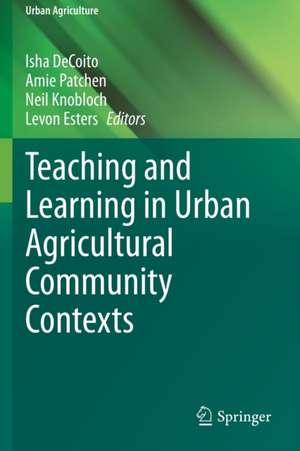Teaching and Learning in Urban Agricultural Community Contexts: Urban Agriculture
Editat de Isha DeCoito, Amie Patchen, Neil Knobloch, Levon Estersen Limba Engleză Paperback – 9 sep 2022
| Toate formatele și edițiile | Preț | Express |
|---|---|---|
| Paperback (1) | 1213.16 lei 43-57 zile | |
| Springer International Publishing – 9 sep 2022 | 1213.16 lei 43-57 zile | |
| Hardback (1) | 1219.63 lei 22-36 zile | |
| Springer International Publishing – 8 sep 2021 | 1219.63 lei 22-36 zile |
Preț: 1213.16 lei
Preț vechi: 1479.46 lei
-18% Nou
Puncte Express: 1820
Preț estimativ în valută:
232.13€ • 243.02$ • 192.08£
232.13€ • 243.02$ • 192.08£
Carte tipărită la comandă
Livrare economică 07-21 aprilie
Preluare comenzi: 021 569.72.76
Specificații
ISBN-13: 9783030728908
ISBN-10: 3030728900
Pagini: 210
Ilustrații: VIII, 210 p. 48 illus., 39 illus. in color.
Dimensiuni: 155 x 235 mm
Greutate: 0.31 kg
Ediția:1st ed. 2021
Editura: Springer International Publishing
Colecția Springer
Seria Urban Agriculture
Locul publicării:Cham, Switzerland
ISBN-10: 3030728900
Pagini: 210
Ilustrații: VIII, 210 p. 48 illus., 39 illus. in color.
Dimensiuni: 155 x 235 mm
Greutate: 0.31 kg
Ediția:1st ed. 2021
Editura: Springer International Publishing
Colecția Springer
Seria Urban Agriculture
Locul publicării:Cham, Switzerland
Cuprins
Chapter 1. An Introduction of Teaching and Learning in Urban Agricultural Community Contexts (Neil Knobloch).- Chapter 2. Community as curriculum: Dewey’s Theory of Inquiry in the Context of an Urban Agriculture Project (Mihye Won and Bertram C. Bruce).- Chapter 3. Forging Research Pathways to Sustainable Farms and Food Systems with an Interdisciplinary Evaluative Framework for Urban Agriculture (Helena K. Farrell).- Chapter 4. Engaging Nashville’s Youth in Farming, Food Choice, and Food Access Issues: Two Programs by a Nashville Nonprofit (Michelle Wooten and Josh Corlew).- Chapter 5. Resurfacing Environmental Identity in Coastal Peru (Daniela Benavides and Adriana Gonzalez-Pestana).- Chapter 6. Permaculture in Action : Urban Farming as Continual Science Learning (Zev H. S. Friedman and Phyllis Katz).- Chapter 7. Learning to Become “Good Food” Educators: Practices and Program Development of an Urban Agriculture Education Organization (Christopher D. Murakami and Heather Gillich).- Chapter 8. The USDA Future Scientists Urban Agriculture Program (Craig Wilson, Carolyn Schroeder, and Timothy Scott).- Chapter 9. Forging the Farm-To-School Connection: Articulating the Vision Behind Food-Based Environmental Education at the Dalton School (Kevin Slick and Mila Tewell).- Chapter 10. Urban Beekeeping as a Tool for STEAM Education (Thomas Schmitt, Kristian Demary, and Noah Wilson-Rich).
Notă biografică
Dr. Isha DeCoito is an Associate Professor of STEM Education at Western University in Canada. She possesses extensive experience in developing successful partnerships and collaborations with stakeholders in a variety of educational contexts including medical programs, school gardens, refugee camps, Aboriginal reservations, science centres, teacher education programs, universities, and school boards. Her research focuses on STEM engagement and STEM career aspirations amongst girls and underrepresented populations, experiential learning, gamification, educational technologies, engineering and medical education, professional development, and nature of science conceptions, with a goal of creating equitable and better opportunities for all students.
Dr. Neil Knobloch is a Professor of Agricultural Science Education at Purdue University, serves as Chair of PU-CoA PK-12 Council, and has extensive project management. His integrated approach to scholarship of discovery, learning, and engagement has advanced educational innovations in university teaching and PK-12 outreach to engage and retain more students in the agricultural STEM career pipeline. He has demonstrated campus and national leadership in advancing diversity in agricultural STEM majors by co-directing the Mentoring@Purdue (M@P) Program and building partnerships with nine Historically Black Land-Grant Universities.
Dr. Levon T. Esters is a Professor in the Department Agricultural Sciences Education and Communication at Purdue University. He received a B.S. in Agricultural Business from Florida A&M University, an M.S. in Agricultural Education from North Carolina A&T State University, and a Ph.D. in Agricultural and Extension Education from Pennsylvania State University. Dr. Esters serves as the Director of the Mentoring@Purdue (M@P) program which is designed to increase the number of women and underrepresented minorities (URMs) receiving advanced post-secondary STEM-based agricultural and life sciences degrees in Purdue’s College of Agriculture. Dr. Esters is a nationally recognized scholar on mentoring, equity, and diversity within the STEM-based agricultural and life sciences disciplines. His research focuses on issues of educational equity and access of URM students with a concentration on the mentoring of Black graduate students; STEM career development of students attending Historically Black Land-Grant Colleges and Universities; and educational and professional mobility of Black graduatestudents and faculty. Dr. Esters also serves as a Senior Research Associate at The Rutgers Center for Minority Serving Institutions.
Textul de pe ultima copertă
This book fills a void in the literature around how urban agricultural education can be used to create opportunities to educate youth and citizens who live in urban areas about growing food. To date, very little has been written about program design and the impact of such experiences on learning outcomes. In fact, most of the journal articles and research to date has focused on access, contextual factors, sustainability, relevance of urban agricultural education, and the intersection of science of agriculture. This book will cover such topics as how urban youth learn science while engaged in urban agriculture programs, how such programs support youth in becoming interested about healthy eating and science more generally, and how to design urban agriculture programs in support of STEM education. The chapters in this book are written by educational researchers and each chapter has been reviewed by researchers and practitioners.
Caracteristici
Unique Contribution to the Literature on Urban Agriculture serving as an exciting Educational Model for Students of all Ages Summarizes recent Studies on Research-Based Perspectives related to the Impact of Urban Agriculture Programs on Student Learning Highlights effective Models and Principles on Designing Urban Agricultural Programs This Book examines the Effectiveness of Urban Agriculture and the Potential to Elevate this Role as an Effective Pedagogical Approach in a Formal and Non-Formal/Informal Educational Context













